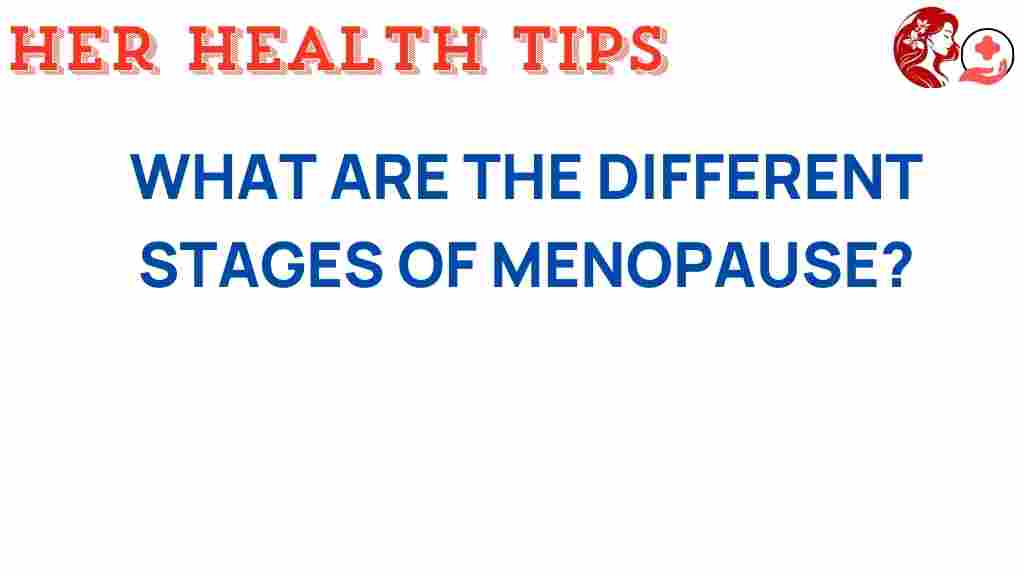Unveiling the Stages of Menopause: What Every Woman Should Know
Menopause is a significant transition in a woman’s life, marking the end of her reproductive years. Understanding the stages of menopause, the associated symptoms, and the hormonal changes that occur can empower women to navigate this midlife phase with confidence. In this comprehensive guide, we will explore the stages of menopause, their effects on women’s health, and available resources for wellness and education.
What is Menopause?
Menopause is defined as the time in a woman’s life when her menstrual periods cease, typically occurring between the ages of 45 and 55. It is a natural biological process brought about by hormonal changes, primarily the decline in estrogen and progesterone production by the ovaries. This transition can lead to various symptoms and health changes, making it crucial for women to be informed and prepared.
The Stages of Menopause
Menopause is not a singular event but rather a process that unfolds in three stages:
- Perimenopause: This is the transitional phase leading up to menopause. It can begin several years before menstruation stops, often starting in a woman’s 40s. During perimenopause, hormonal fluctuations can cause irregular periods and various symptoms.
- Menopause: Officially marked when a woman has not had a menstrual period for 12 consecutive months. This stage indicates that the ovaries have ceased producing eggs and that estrogen levels have significantly dropped.
- Postmenopause: This stage follows menopause and lasts for the rest of a woman’s life. Symptoms may continue for some, but the risk of certain health conditions increases due to decreased estrogen levels.
Symptoms of Menopause
Women experience a variety of symptoms during the stages of menopause, which can vary in intensity and duration. Common symptoms include:
- Hot Flashes: Sudden feelings of warmth, often accompanied by sweating and redness.
- Night Sweats: Hot flashes that occur during sleep, leading to disrupted rest.
- Irregular Periods: Changes in menstrual cycle length, flow, and occurrence.
- Sleep Issues: Insomnia or difficulty falling asleep can be common during menopause.
- Mood Changes: Increased irritability, anxiety, and depression may occur.
- Vaginal Dryness: Decreased estrogen can lead to dryness and discomfort during intercourse.
- Memory and Concentration Issues: Some women report difficulties with focus and memory.
Understanding Hormonal Changes
The hormonal changes during menopause are complex. As women approach menopause, their estrogen and progesterone levels fluctuate significantly. Here’s how these changes impact women’s health:
- Decreased Estrogen: This can lead to various symptoms, including hot flashes, mood changes, and increased risk of osteoporosis.
- Progesterone Levels Drop: This may contribute to irregular periods and changes in the menstrual cycle.
- Increased Androgens: Some women may experience an increase in testosterone, which can lead to hair growth or thinning.
Impact on Women’s Health
Menopause significantly impacts women’s health, both physically and emotionally. Understanding these effects is crucial for managing health during midlife:
- Bone Health: The drop in estrogen increases the risk of osteoporosis, making bones weaker and more susceptible to fractures.
- Cardiovascular Health: The risk of heart disease increases post-menopause due to changes in cholesterol levels and blood pressure.
- Mental Health: Mood swings, anxiety, and depression can become more pronounced during and after menopause.
Wellness and Management During Menopause
Managing menopause involves a combination of lifestyle changes, education, and sometimes medical interventions. Here are steps every woman can take for better wellness:
- Nutrition: A balanced diet rich in calcium and vitamin D can support bone health. Include plenty of fruits, vegetables, and whole grains.
- Regular Exercise: Engaging in regular physical activity can help manage weight, reduce stress, and improve mood.
- Stress Management: Techniques such as yoga, meditation, and deep breathing can help alleviate stress and promote mental well-being.
- Regular Check-ups: Routine health screenings can help monitor and manage any emerging health issues.
Educational Resources and Support
Education is vital for women navigating menopause. There are numerous resources available:
- Books: There are many informative books on menopause that provide insights and coping strategies.
- Online Resources: Websites like The North American Menopause Society offer valuable information and resources.
- Support Groups: Joining support groups can provide emotional support and shared experiences, making the transition easier.
Troubleshooting Common Issues
Women may face specific challenges during menopause. Here are some common issues and troubleshooting tips:
1. Hot Flashes
Hot flashes can be uncomfortable and disruptive. To manage them, consider:
- Wearing layers of clothing for adaptability.
- Avoiding triggers such as caffeine, spicy foods, and alcohol.
- Practicing relaxation techniques to reduce stress.
2. Sleep Disturbances
For those struggling with sleep issues, try the following:
- Establishing a regular sleep schedule.
- Creating a comfortable sleep environment, free from disruptions.
- Limiting screen time before bed.
3. Vaginal Dryness
To alleviate vaginal dryness, consider:
- Using water-based lubricants during intercourse.
- Discussing options for estrogen therapy with a healthcare provider.
Conclusion
Menopause is a natural stage in a woman’s life that comes with both challenges and opportunities for growth. By understanding the stages of menopause, its symptoms, and hormonal changes, women can better prepare themselves for this transition. Prioritizing women’s health through education, lifestyle changes, and seeking support can enhance wellness during midlife. Remember, every woman’s experience is unique; therefore, it’s essential to find the right resources and strategies that work for you. Embrace this new chapter with confidence and knowledge, and don’t hesitate to reach out for help when needed.
For more information on managing menopause, explore our detailed resources and take charge of your health today!
This article is in the category Reproductive and created by HerHealthTips Team
